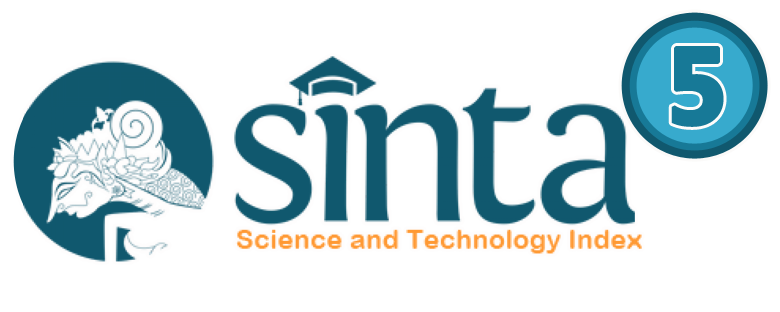THE EFFECT OF E-LEARNING TOWARD STUDENTS LEARNING INTEREST AT PANDEMIC COVID’19 ERA IN RURAL AREA
Abstract
Tehnology has played as a significant role in teaching and learning. As an aspect of technology,
E-learning has been believed to be an effective learning media of higher educational in institution.
Pandemic Covid’19 is really having huge impact for people around the world unexpected in
educational field. In this era, the activity of teaching and learning process was changed to be an
online term. Thus, the objective of this research is to explore the effect of E learning toward
students learning interest in Covid’19 era especially in rural area. The researcher conducted in
Akademi Kebidanan Wahana Husada Bandar Jaya Central Lampung. The population of this
research is the students in AKBID Wahana Husada Bandar Jaya at the first semester in academic
year 2020/2021. The data collecting technique is using questionnaire, and to analysis the data, the
researcher used T-test. The finding of this research, the students more interest to join the class
meeting by E-learning. It saw by their result in fulfill the questionnaire. The result showed that E
learning is having positive effect toward students learning interest in Covid’19 era. The students
felt enjoy with this kind of learning.
Keywords
Full Text:
PDFReferences
Aini, Q., Budiarto, M., Putra, P. O. H., & Rahardja, U. (2020). Exploring E-learning
Challenges During the Global COVID-19 Pandemic: A Review. Jurnal Sistem
Informasi, 16(2), 57–65. https://doi.org/10.21609/jsi.v16i2.1011
Al-Fraihat, D., Joy, M., Masa’deh, R., & Sinclair, J. (2020). Evaluating E-learning systems
success: An empirical study. Computers in Human Behavior, 102(June 2019),
–86. https://doi.org/10.1016/j.chb.2019.08.004
Ayu, M. (2020). Online Learning: Leading e-Learning at Higher Education. The Journal of
English Literacy Education: The Teaching and Learning of English as a Foreign
Language, 7(1), 47–54. https://doi.org/10.36706/jele.v7i1.11515
James KPOLOVIE, P., Igho JOE, A., & Okoto, T. (2014). Academic Achievement
Prediction: Role of Interest in Learning and Attitude towards School. International
Journal of Humanities Social Sciences and Education, 1(11), 73–100.
www.arcjournals.org
Kaisara, G., & Bwalya, K. J. (2020). Investigating the E-Learning Challenges Faced by
Students during Covid-19 in Namibia. International Journal of Higher Education,
(1), 308. https://doi.org/10.5430/ijhe.v10n1p308
Konwar, H. (2017). A Study on Attitude of College Students towards E-learning with
Special Reference to North Lakhimpur of Lakhimpur District, Assam. International
Journal of Information Science and Education, 4(1), 1–9.
http://www.ripublication.com
Król, S. (2016). E – learning as an innovative method of education. Journal,of World
Scientific News, 48(2016), 178–182.
Maguil, C. J. M., & Ismawan Prasetia Devi. (2020). A New trend in understanding
students’ interest in learning science: microetnography. Integrated Science
Education Journal, 1(2), 62–66. https://doi.org/10.37251/isej.v1i2.72
Natalia, N. N. (2018). Correlation Between Reading Interest With Result of Study.
Indonesian Journal of Education and Learning, 2(1), 162.
https://doi.org/10.31002/ijel.v2i1.892
Ngwu, O. G. (2015). The Effect of E-Learning on Secondary School Students ’ Interest in
Basic Statistics. 1–5.
Nuraisyah, S., Harahap, R. D., & Harahap, D. A. (2021). Analysis of Internet Media Use
of Student Biology Learning Interest During COVID-19. Jurnal Penelitian Pendidikan
IPA, 7(2), 213–217. https://doi.org/10.29303/jppipa.v7i2.624
Rina Wahyuni, Surti Nur Utami, (2021)
The Effect Of E-Learning Toward Students’ Learning Interest at Pandemic Covid 19 in Rural Area
NUMBER PAGE
Onyema, E. M. (2020). Integration of emerging technologies in teaching and learning
process in nigeria: the challenges. Central Asian Journal of Mathematical Theory
and Computer Sciences, 1(1), 35–39.
Onyema, E. M., Nkiruka, P., Chika Eucheria, N., Uchenna, E. C., & Ukamaka Eucheria,
A. (2020). Impact of E-learning Platforms on Students’ Interest and Academic
Achievement in Data Structure Course. CCU Journal of Science, 1(1), 1–16.
https://www.researchgate.net/publication/343933988
Resdasari Prasetyo, A., Nurtjahjanti, H., & Ardhiani, L. N. (2021). Impact of Changes in
Teaching Methods During the COVID-19 Pandemic: The Effect of Integrative E-
Learning on Readiness for Change and Interest in Learning Among Indonesian
University Students. International Review of Research in Open and Distance
Learning, 22(2), 87–101. https://doi.org/10.19173/irrodl.v22i2.5143
Sathishkumar, V., Radha, R., Saravanakumar, A., & K. Mahalakshmi. (2020). E-Learning
during Lockdown of Covid-19 Pandemic: A Global Perspective. International Journal
of Control and Automation, 13(June), 1088–1099.
Shahzad, A., Hassan, R., Aremu, A. Y., Hussain, A., & Lodhi, R. N. (2021). Effects of
COVID-19 in E-learning on higher education institution students: the group
comparison between male and female. Quality and Quantity, 55(3), 805–826.
https://doi.org/10.1007/s11135-020-01028-z
Suhartini, D. (2010). E-Learning Usage To Improving Student ’ S Learning Interest and.
Historia, XI(2), 176–197.
Thakkar, S., Polytechnic, G., & Joshi, H. (2017). Students Attitude Towards E-Learning.
International Journal of Advance Engineering and Research Development, 4(11).
https://doi.org/10.21090/ijaerd.15380
Vershitskaya, E. R., Mikhaylova, A. V., Gilmanshina, S. I., Dorozhkin, E. M., &
Epaneshnikov, V. V. (2020). Present-day management of universities in Russia:
Prospects and challenges of e-learning. Education and Information Technologies,
(1), 611–621. https://doi.org/10.1007/s10639-019-09978-0
Wahyuni, R., & Lampung, C. (2020). Artikel Hasil Penelitian VOCABULARY GAMES TO
INCREASE THE STUDENTS’ VOCABULARY MASTERY AT DIFFERENT LEVEL
OF LEARNING INTEREST. 2, 39–46.
DOI: https://doi.org/10.36269/sigeh.v2i2.1100
Refbacks
- There are currently no refbacks.

This work is licensed under a Creative Commons Attribution-ShareAlike 4.0 International License.
ISSN ONLINE: 2775-8834




1.png)










